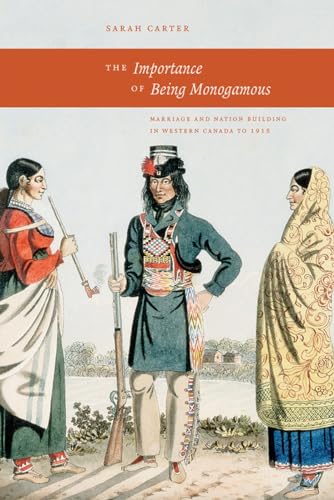The Importance of Being Monogamous: Marriage and Nation Building in Western Canada to 1915 - Couverture souple

Synopsis
Sarah Carter provides a detailed description of marriage as a diverse social institution in nineteenth-century Western Canada, and the subsequent ascendancy of Christian, lifelong, heterosexual, monogamous marriage as an instrument to implement dominant British-Canadian values. It took work to impose the monogamous model of marriage as the region was home to a varied population of Aboriginal people and newcomers such as the Mormons, each of whom had their own definitions of marriage, including polygamy and flexible attitudes toward divorce. The work concludes with an explanation of the negative social consequences for women, particularly Aboriginal women, that arose as a result of the imposition of monogamous marriage. "Of an immense amount of new and pathbreaking research on Native people over the past 20 years, this work stands out." -Sidney L. Harring, Professor of Law at City University of New York and author of White Man's Law: Native People in Nineteenth-Century Canadian Jurisprudence
Les informations fournies dans la section « Synopsis » peuvent faire référence à une autre édition de ce titre.
À propos de l?auteur
Sarah Carter, FRSC, is Professor and Henry Marshall Tory Chair in the Department of History and Classics and in the Faculty of Native Studies at the University of Alberta. She is a specialist in the history of Western Canada and is the author of Aboriginal People and Colonizers of Western Canada to 1900, Capturing Women, and Lost Harvests. From Saskatoon, she studied Canadian history at the University of Saskatchewan and the University of Manitoba. In 2020, she was awarded the Killam Prize in the Humanities.
Les informations fournies dans la section « A propos du livre » peuvent faire référence à une autre édition de ce titre.
Résultats de recherche pour The Importance of Being Monogamous: Marriage and Nation...
The Importance of Being Monogamous: Marriage and Nation Building in Western Canada to 1915 (The West Unbound: Social and Cultural Studies)
Vendeur : KuleliBooks, Phoenix, AZ, Etats-Unis
Etat : Good. The book may have minor cosmetic wear (i.e. creased spine/cover, scratches, curled corners, folded pages, minor sunburn, minor water damage, minor bent). The book may have some highlights/notes/underlined pages - Accessories such as CD, codes, toys, may not be included - Safe and Secure Mailer - No Hassle Return. N° de réf. du vendeur 521YH0000OCQ
Acheter D'occasion
Quantité disponible : 1 disponible(s)
The Importance of Being Monogamous: Marriage and Nation Building in Western Canada to 1915
Vendeur : ThriftBooks-Dallas, Dallas, TX, Etats-Unis
Paperback. Etat : Good. No Jacket. Pages can have notes/highlighting. Spine may show signs of wear. ~ ThriftBooks: Read More, Spend Less. N° de réf. du vendeur G0888644906I3N00
Acheter D'occasion
Quantité disponible : 1 disponible(s)
The Importance of Being Monogamous: Marriage and Nation Building in Western Canada to 1915
Vendeur : ThriftBooks-Atlanta, AUSTELL, GA, Etats-Unis
Paperback. Etat : Good. No Jacket. Pages can have notes/highlighting. Spine may show signs of wear. ~ ThriftBooks: Read More, Spend Less. N° de réf. du vendeur G0888644906I3N00
Acheter D'occasion
Quantité disponible : 1 disponible(s)
The Importance of Being Monogamous: Marriage and Nation Building in Western Canada to 1915 (The West Unbound: Social and Cultural Studies)
Vendeur : One Planet Books, Columbia, MO, Etats-Unis
paperback. Etat : Good. First Edition. Ships in a BOX from Central Missouri! May not include working access code. Will not include dust jacket. Has used sticker(s) and some writing and/or highlighting. UPS shipping for most packages, (Priority Mail for AK/HI/APO/PO Boxes). N° de réf. du vendeur 001008338U
Acheter D'occasion
Quantité disponible : 9 disponible(s)
The Importance of Being Monogamous: Marriage and Nation Building in Western Canada to 1915 (The West Unbound: Social and Cultural Studies)
Vendeur : Textbooks_Source, Columbia, MO, Etats-Unis
paperback. Etat : Good. First Edition. Ships in a BOX from Central Missouri! May not include working access code. Will not include dust jacket. Has used sticker(s) and some writing or highlighting. UPS shipping for most packages, (Priority Mail for AK/HI/APO/PO Boxes). N° de réf. du vendeur 001008338U
Acheter D'occasion
Quantité disponible : 10 disponible(s)
Importance of Being Monogamous : Marriage and Nation Building in Western Canada to 1915
Vendeur : GreatBookPrices, Columbia, MD, Etats-Unis
Etat : good. May show signs of wear, highlighting, writing, and previous use. This item may be a former library book with typical markings. No guarantee on products that contain supplements Your satisfaction is 100% guaranteed. Twenty-five year bookseller with shipments to over fifty million happy customers. N° de réf. du vendeur 5530666-5
Acheter D'occasion
Quantité disponible : 5 disponible(s)
The Importance of Being Monogamous: Marriage and Nation Building in Western Canada to 1915 (The West Unbound: Social and Cultural Studies)
Vendeur : Three Hills Books, Three Hills, AB, Canada
Paperback. Etat : Good. Faint soiling on cover. Light age toning and soiling on page edge. Previous owners name. N° de réf. du vendeur 001910
Acheter D'occasion
Quantité disponible : 1 disponible(s)
The Importance of Being Monogamous: Marriage and Nation Building in Western Canada to 1915 (West Unbound: Social and Cultural Studies)
Vendeur : Three Hills Books, Three Hills, AB, Canada
Paperback. Etat : Very Good. A little wear on cover edge and corners. N° de réf. du vendeur 000288
Acheter D'occasion
Quantité disponible : 1 disponible(s)
Importance of Being Monogamous : Marriage and Nation Building in Western Canada to 1915
Vendeur : GreatBookPrices, Columbia, MD, Etats-Unis
Etat : As New. Unread book in perfect condition. N° de réf. du vendeur 5530666
Acheter D'occasion
Quantité disponible : 5 disponible(s)
Importance of Being Monogamous : Marriage and Nation Building in Western Canada to 1915
Vendeur : GreatBookPrices, Columbia, MD, Etats-Unis
Etat : New. N° de réf. du vendeur 5530666-n
Acheter neuf
Quantité disponible : 5 disponible(s)
